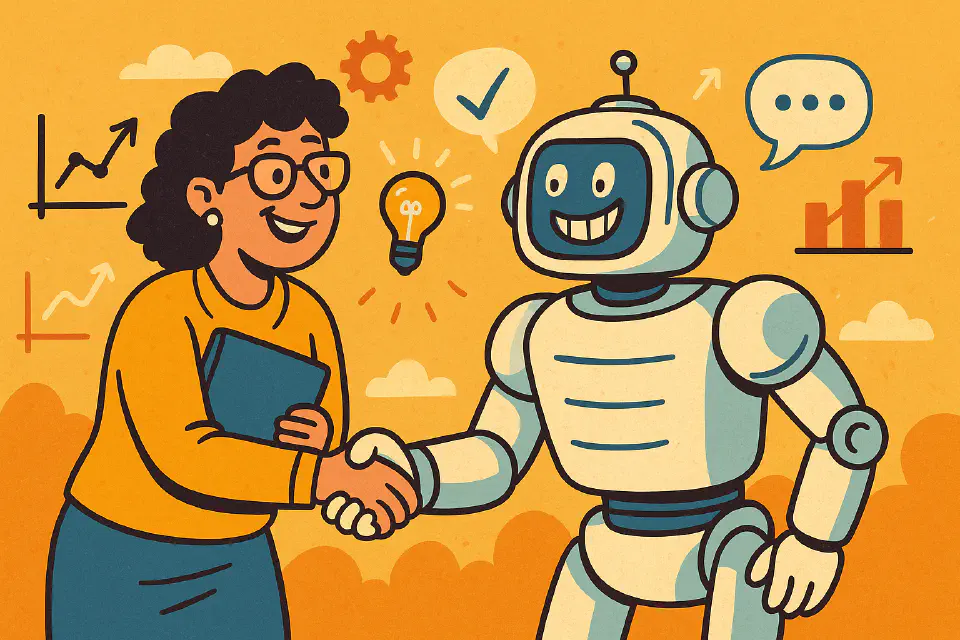
How HR Can Stay Relevant in the Face of AI
As AI reshapes work, HR isn't becoming obsolete—it's becoming more critical. This article explores the key skills HR leaders need to stay ahead: from digital fluency to change management, data storytelling to human-centered leadership.
AI won’t replace HR. But HR that doesn’t adapt might replace itself.
In a world of ChatGPT job ads and algorithmic sourcing, it’s easy to feel like HR is on the verge of being automated out of relevance. But here’s the truth: the rise of AI doesn’t make HR obsolete—it makes it indispensable. Provided, of course, we evolve.
The challenge for HR in 2025 isn’t fighting off the robots. It’s learning to partner with them. The winners won’t be the most technical HR pros. They’ll be the most adaptable, human, and strategic. So what skills will keep you not only relevant but thriving in this AI-driven future?
Digital Fluency: HR’s New Core Competency
You don’t need to code. But you do need to understand how technology thinks.
Digital fluency today means more than knowing your way around your ATS (Applicant Tracking System). It means:
- Knowing how to evaluate AI tools for bias.
- Prompting large language models effectively.
- Understanding basic data flows in your HRIS.
- Navigating platforms like LinkedIn Recruiter or ChatGPT with confidence.
Being able to talk tech with vendors, IT, and data analysts is quickly becoming table stakes. And it starts with one mindset shift: curiosity over fear.
How to build it
Start by taking ownership of your own upskilling. Free AI prompt-writing courses, short MOOCs, or even internal demos can unlock confidence fast. Pair that with a working knowledge of your own tech stack, and you’re already ahead of the curve.
Data Storytelling: From Numbers to Narrative
We’ve spent a decade teaching HR to be data-driven. But that’s no longer enough.
Leadership doesn’t want spreadsheets. They want stories. Stories that:
- Show how people initiatives support business goals.
- Translate turnover or engagement into risk or opportunity.
- Use visualizations that speak the CFO’s language.
Collecting data is easy. Communicating its meaning is the differentiator.
Human-Centered Leadership in a Machine World
If AI brings efficiency, humans bring empathy.
In a hybrid, fast-changing world, what sets HR apart is not just insight but care. We’re seeing rising burnout, growing DEI expectations, and generational shifts in how people define good work.
That means:
- Listening deeply.
- Leading inclusively.
- Making mental health part of strategy, not perks.
- Designing for psychological safety.
These aren’t soft skills—they’re power skills.
Continuous Learning: Reskill or Risk Irrelevance
Learning isn’t a program. It’s a survival skill.
The half-life of a skill is now about five years. That means:
- SHRM certification won’t carry you forever.
- HRBPs must learn agile frameworks.
- Talent managers should understand design thinking.
- Recruiters should experiment with new sourcing AI.
If we’re asking employees to learn, we have to model it first.
Talent Intelligence: Smarter, Not Louder
In 2025, recruiting is strategy.
Smart HR leaders look beyond sourcing. They ask:
- What does the labor market say about our EVP?
- Which roles face the highest flight risk?
- Where can we build vs. buy talent?
AI helps with insights, but judgment still lives with humans. Talent intelligence blends analytics with experience to make hiring a business advantage.
Employer Branding Is Everyone’s Job
You may not be in marketing, but you are in brand.
Every email, job ad, and LinkedIn post tells a story about your culture. In a talent-scarce market, candidates Google your Glassdoor page before they read your benefits brochure.
What matters:
- Transparency about remote/hybrid expectations.
- Consistency between EVP (employee value proposition) and experience.
- Authentic voices from your people.
HR is no longer just managing internal culture—it’s shaping external reputation.
Change Management: The Make-or-Break Skill
Reorgs, tech shifts, new leadership… change is constant.
The HR pros who thrive are the ones who can:
- Communicate clearly through ambiguity.
- Use frameworks like Kotter or ADKAR to build adoption.
- Coach managers through uncertainty.
HR that can lead change doesn’t just support transformation—it drives it.
What AI Can’t Do: The Human Advantage
AI can parse resumes. It can schedule interviews. It might even write decent onboarding emails.
But it can’t:
- Build trust.
- Understand cultural nuance.
- Mentor a struggling manager.
- Navigate organizational politics.
These are the deep skills of HR. The ones we must double down on as automation takes the admin off our plate.
Final Thought: Lead the Change, Don’t Chase It
Relevance is not about knowing every tool. It’s about knowing what to do with it.
The future of HR belongs to those who can combine tech with judgment, data with story, and speed with empathy. If we bring the mindset of experimentation, the humility to keep learning, and the courage to show up fully human—no robot can touch us.
Let’s not wait to be told what AI means for HR. Let’s shape the answer.
Stay bold. Stay curious. Stay deeply, unapologetically human.